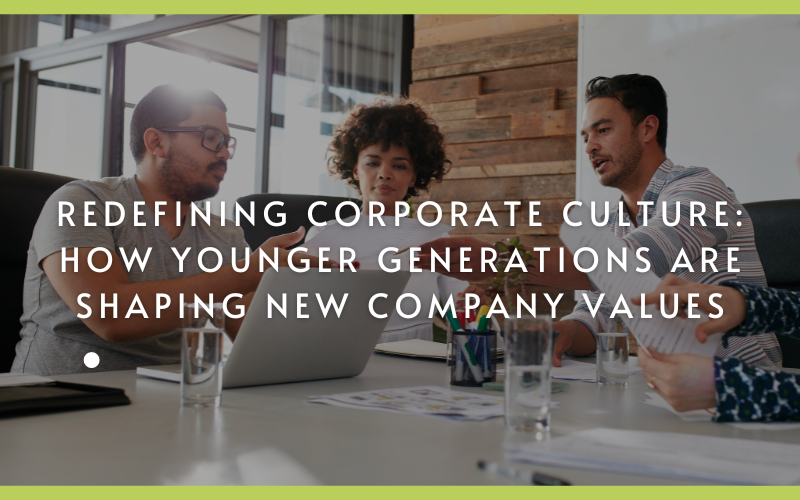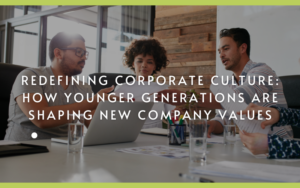In today’s rapidly evolving workplace, it’s becoming increasingly clear that younger generations are reshaping the landscape of corporate values in ways that diverge significantly from their older counterparts.
As Gen Z and Millennials begin to dominate the workforce, their expectations and priorities are driving a shift in how companies operate and what they stand for. This change is not just a trend, but a reflection of the more fundamental ways our society is changing and evolving, especially regarding attitudes towards work-life balance, sustainability, and inclusivity.
In the past, the economy allowed for Gen X and Boomers to find a role that suits them, experience job security and a near guarantee of career progression in exchange for loyalty. The modern economy simply does not allow for this in most companies, and younger generations recognise there’s unlikely to be any reward for staying at one company on a long term basis.
Due to this fact, younger employees place a higher premium on flexibility, purpose-driven work, and corporate social responsibility. This generational divide is prompting companies to reassess their values and adapt their practices to attract and retain top talent in an increasingly competitive market.
In this blog post, we’ll explore the key differences in company values between younger and older generations, examining how these shifting priorities are influencing everything from corporate culture to business strategies.

Social and Environmental Responsibility
For Gen Z and Millennials, social and environmental responsibility is more than a buzzword—it’s a fundamental expectation. Growing up amidst the challenges of climate change, economic instability, and social inequality, these generations have developed a keen awareness of the global issues that impact their futures. They believe that businesses have a critical role to play in addressing these challenges, beyond merely generating profit.
This heightened sense of responsibility is driven by a desire to work for companies that align with their personal values and contribute positively to society. They are more informed and vocal about issues like climate change, resource depletion, and social justice, and they expect their employers to take meaningful action rather than just paying lip service.
Moreover, these younger workers recognize that a company’s commitment to social and environmental causes reflects its overall integrity and ethical standards. They see responsible practices as integral to long-term business success and sustainability. As a result, they are increasingly attracted to organizations that not only prioritize profitability but also demonstrate a genuine commitment to making a positive impact on the world. This alignment of values is crucial for attracting and retaining top talent in today’s competitive job market.

Inclusivity and Diversity
Younger generations have grown up in increasingly multicultural environments and are more attuned to the benefits of diverse perspectives. They recognize that diverse teams bring a wealth of ideas and experiences, which can drive innovation and lead to better decision-making and problem-solving.
For young people, inclusivity goes beyond mere representation; it encompasses creating environments where everyone feels valued and empowered. They are drawn to workplaces that actively foster a culture of respect and belonging, where differences are not just acknowledged but celebrated. This is because they understand that a truly inclusive environment promotes mental well-being, encourages collaboration, and enhances job satisfaction.
Additionally, younger workers are often highly engaged with social justice issues and expect their employers to reflect their values. They are more likely to support companies that demonstrate a genuine commitment to diversity through their hiring practices, workplace culture, and community outreach. In essence, inclusivity and diversity are seen as fundamental to ethical business practices and are key factors in attracting and retaining young talent in today’s dynamic job market.

Flexibility and Work-Life Balance
Flexibility and work-life balance are not just perks—they are essential values that significantly influence job satisfaction and overall well-being. Growing up in a digital age, younger generations are accustomed to a world where work can be done from anywhere, and they value the ability to integrate their professional and personal lives seamlessly. They see flexibility as a means to achieve a healthier work-life balance, which is crucial for maintaining mental and physical health.
The emphasis on flexibility also reflects a shift in priorities, with younger workers seeking to align their careers with their personal lives rather than the other way around. They appreciate work environments that offer remote work options, flexible hours, and a focus on results rather than rigid schedules. This flexibility allows them to manage responsibilities such as family care, education, or personal projects more effectively.

Purpose and Mission
Generally speaking, Gen Z and Millennials believe working for companies with a clear and meaningful purpose is a high priority. This stems from their desire to align their professional lives with their personal values and contribute to something greater than themselves. Having grown up amid global challenges such as climate change, social inequality, and economic uncertainty, they are deeply aware of the impact that businesses can have on society and the environment.
For these generations, a company’s purpose goes beyond profit; it encompasses a commitment to social responsibility, ethical practices, and positive community impact. They seek employers whose missions resonate with their own beliefs, whether it’s through sustainability initiatives, social justice efforts, or community engagement. A company’s purpose provides a sense of direction and motivation, making work feel more rewarding and fulfilling.
Moreover, working for a purpose-driven organization fosters a sense of pride and loyalty. Employees are more likely to be engaged and dedicated when they believe their work contributes to a larger, meaningful goal. In a competitive job market, companies that articulate a strong, purpose-driven vision can attract and retain top talent who are looking to make a positive difference through their careers.

To attract and retain top talent in today’s competitive job market, it’s clear that companies should be considering the changing values of younger generations. By embracing these values, companies not only enhance their appeal to a motivated and engaged workforce but also foster a culture that drives innovation and long-term success. Paying attention to these priorities is essential for building a resilient, forward-thinking organization.





